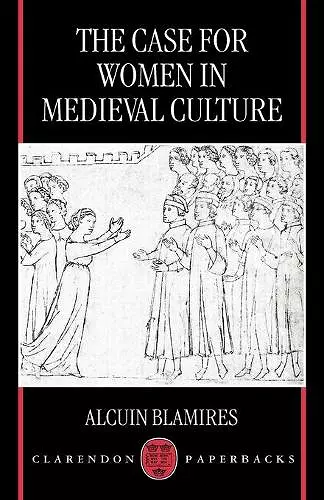The Case for Women in Medieval Culture
Format:Paperback
Publisher:Oxford University Press
Published:27th Aug '98
Currently unavailable, and unfortunately no date known when it will be back

Misogyny is of course not the whole story of medieval discourse on women: medieval culture also envisaged a case for women. But hitherto studies of profeminine attitudes in that periods culture have tended to concentrate on courtly literature or on female visionary writings or on attempts to transcend misogyny by major authors such as Christine de Pizan and Chaucer. This book sets out to demonstrate something different: that there existed from early in the Middle Ages a corpus of substantial traditions in defence of women, on which the more familiar authors drew, and that this corpus itself consolidated strands of profeminine thought that had been present as far back as the patristic literature of the fourth century. The Case for Women surveys extant writings formally defending women in the Middle Ages; breaks new ground by identifying a source for profeminine argument in biblical apocrypha; offers a series of explorations of the background and circulation of central arguments on behalf of women; and seeks to situate relevant texts by Christine de Pizan, Chaucer, Abelard, and Hrotsvitha in relation to these arguments. Topics covered range from the privileges of women, and pro-Eve polemic, to the social and moral strengths attributed to women, and to the powerful modelsfrequently disruptive of patriarchal complacencypresented by Old and New Testament women. The contribution made by these emphases (which are not to be confused with feminism in a modern sense) to medieval constructions of gender is throughout critically assessed, and the book concludes by asking how far defenders were controlled by, or able to query, assumptions about what was natural (and therefore imagined inflexible) in gender theory.
sober, learned, and elegant monograph ... Blamires's book is a deeply informative and scholarly study of the defences of women produced in the high and late Middle Ages. Sound scholarship is everywhere on display, especially in tracing the textual and scriptural origins of the formal defence and its misogynous context, and in particular in identifying the importance of the third Book of Esdras as a source. He provides a useful history of formal defences of women from the end of the eleventh century, with summaries of their innovations. Blamires is especially interesting on the question of maternity. * Diane Purkiss, Medium Aevum, vol 68, no 1 *
Blamires convincingly illustrates that however mired in the self-reflective constructs of male authority, there was an increasingly vigourous case made on behalf of women in the literature of the Middle Ages. Blamires' achievement lies not only in laying bare roots of this tradition, but in judiciously presenting medieval texts both on their own terms and in the unflinching light of contemporary feminist theory. Blamires has here summarized and evaluated texts from the eleventh to fourteenth centuries in concise and fluid modern English: a wise decision, making an admirable lucidity of argument and hopefully a wide disemination of the work. * The Women's Review of Books, Vol XV No 6, March 1998 *
This study is a welcome response and complement to the recent emphasis on medieval misogyny ... an appropriately complex impression of medieval views of women ... Well read in modern feminist scholarship and in medieval and early modern literature, and generous in acknowledging the work of others, Blamires offers rich bibliographic references in the notes and the bibliography. This work is a treasury of valuable material. * Joan M. Ferrante, Columbia University, Jrnl of English and Germanic Philology, July 1999 *
a welcome presentation and analysis of the medieval textual tradition purporting to defend the good name of women ... This book is a pleasure to read, and it will certainly become a standard reference. Both erudite and accessible, its often complex material is presented with rigour and insight; the discussion puts the texts in their social and cultural contexts, and considers them on their own terms as well as from a late-twentieth-century perspective. The twenty-two page bibliography is a mine of information. There is no doubt that The Case for Women will find its place on many reading lists, and not just for students of medieval literature. * F. H. M. Le Saux, University of Reading, MLR, 94.3 1999 *
This intelligent and interesting book. Alcuin Blamires here turns to a generic and thematic analysis of a relatively neglected corpus of texts that constitute what he defines as 'the case for women'... the book surveys a sufficiently wide range of material to suggest its value for those studying medieval and early modern culture. Blamires has made a significant contribution to our sense of how medieval writers manipulated and renewed their intellectual heritage. * Arlyn Diamond, Studies in the Age of Chaucer *
Alcuin Blamires,The Case for Women in Medieval Culture is a pioneering study of the philosophical and theological tradition of pro-feminine arguments which established writers such as C. were able to draw upon in their defence of women against misogynist opinion. * Modern Language Studies *
ISBN: 9780198186304
Dimensions: 216mm x 138mm x 18mm
Weight: 395g
288 pages